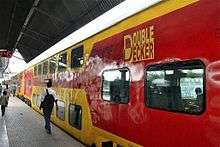Howrah–Dhanbad Double Decker Express
 | |
| Overview | |
|---|---|
| Service type | Superfast Double-Decker |
| Status | Discontinued |
| Locale | West Bengal & Jharkhand |
| First service | October 1, 2011[1] |
| Last service | December 2014 |
| Current operator(s) | Eastern Railways |
| Route | |
| Start | Howrah Junction (HWH) |
| Stops | 5 |
| End | Dhanbad Junction (DHN) |
| Distance travelled | 259 km |
| Average journey time | 4 hrs 15 mins |
| Service frequency | All Days Except Sunday |
| Train number(s) | 12385/12386 |
| On-board services | |
| Class(es) | AC Chair Car |
| Seating arrangements | Available |
| Catering facilities | Available (paid) |
| Observation facilities | LHB Coaches |
| Baggage facilities | Available |
| Technical | |
| Track gauge | 1,676 mm (5 ft 6 in) |
| Electrification | Yes |
| Operating speed |
Average - 60 km/hr Maximum - 110 km/hr |
The Howrah – Dhanbad Double Decker Express was a superfast train of Indian Railways, which was the first of its type to be introduced. It was accommodated with latest stainless steel LHB Coaches, manufactured at Kapurthala Coach Factory. It connected Kolkata, capital of West Bengal and Dhanbad, an important town in Jharkhand. With this India joins the league of Europe and North America that run double-decker trains. This new AC design had several features namely stainless steel body, high-speed Eurofima design bogies with air springs and fire safety-features. The coaches had a control discharge toilet system. The train comprised five AC Double Deck Chair Cars and two End-On-Generation Vans. This train was regularly hauled by a WAP 7 locomotive. Sometimes, a WAP-4 locomotive was also be seen as an off-link. The train last ran in December 2014. Since 1 January 2015, the train has been Cancelled/Discontinued. At present the train is laying unmaintained in platform no.16 of Howrah station. This train is considered as one of the most unsuccessful train in this route. According to recent news reports the train will be scrapped sooner than later.
See also
References
- ↑ "The first AC Double Decker train was introduced between Howrah-Dhanbad in 2011". Government of India. Press Information Bureau. Retrieved 24 August 2012.